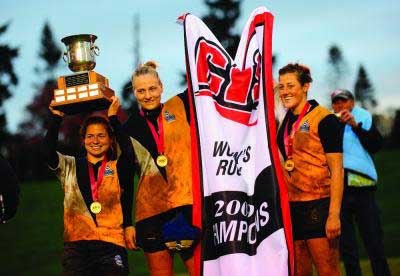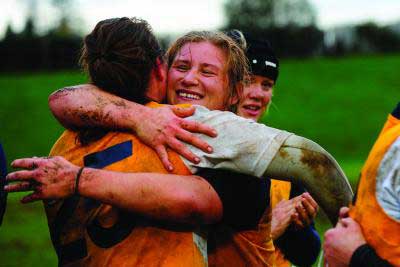For a program that has claimed three successive national championships, remarkably, the University of Lethbridge Pronghorns women's rugby team does not focus on winning. The goal for this group is to see just a little improvement every day and – for three years – it has made the Horns better than every other post-secondary team in the country.
"Our focus is on each person finding her role and then improving within that role," says U of L head coach Neil Langevin (BA/BEd '91). "The question we ask is: 'How are you going to make the Pronghorns better today?' We just continue working on improvement – it's very much a process that is not focused solely on results."

It is a philosophy born out of necessity. There was a time when the Pronghorns were barely able to field a full roster, they had to borrow uniforms to compete and were thrust into a conference dominated by the national champion University of Alberta. Victories then were measured incrementally, not by numbers on a scoreboard.
"It was very much a David-and-Goliath scenario," says Langevin of the Horns' introduction to rugby at the 1999 Canada West championship tournament.
"It was a hodgepodge. We had to borrow jerseys from the Lethbridge Rugby Club, and I was coach, assistant coach, manager, trainer and even had to be a touch judge. We didn't score a single point in the tournament."
Despite the lopsided losses, the program itself was not a lost cause.
"The thing I took away from it was the spirit of our southern Alberta girls," says Langevin, the only coach the Horns have ever had. "We got waxed, but we didn't quit and you could see improvement throughout the entire tournament. I didn't expect we'd go back and win the next year, but I felt we would do OK."
The program's development was measured but steady. The arrival of junior national team member Evelyn McGunigal in 2001 marked the first major recruiting coup for Langevin and a first medal for the Horns, a bronze at the Canada West championships. Consecutive Canada West silver medals over the next two years led to an appearance in the CIS championship tourney in 2003, where the Horns lost to host University of Alberta in the final to finish second nationally.

While consistently losing to the U of A Pandas was frustrating (U of A won five straight CIS titles from 1999 through 2003), it provided the Horns a perfect measuring stick for the growth of their program.
"We knew the standard that we had to get to because we played against U of A all the time," says Langevin. "It was very concrete as to what level we were trying to reach."
As the reputation of the Horns grew, so did their ability to bring in talented players. Langevin became involved with the country's national program and developed key contacts that aided his recruiting efforts. Still, the Horns never strayed from their roots, relying primarily on local talent to fill out the core of the roster.
"We never put a firm number on it, but we've always tried to keep the team about 75 per cent local," says Langevin. "It has made it easier to recruit over the years, and the growth of local high-school rugby has mirrored the growth of our team. The local league is literally one of the best in the country."
Lethbridge native Ashley Patzer is the jewel of the program's recruit-local approach. She joined the Horns in 2005 and succeeded McGunigal as the second Pronghorn to win CIS Rookie of the Year honours. Now a senior national-team member, Patzer is generally regarded as the top back in the country.
She says the Horns were just starting to be taken seriously when she arrived, thanks to the foundation established by pioneers like McGunigal, JJ Ondrus (now an assistant coach) and Paige Burdett. By 2006, Patzer's second year, they were back in the national tournament and won a bronze medal, upsetting the University of Western Ontario on its home field. The following three years reaped CIS gold for the Horns.
"It was fun experiencing the change from my first year to my last year. It's definitely a whole different mindset. In the first year, there was no pressure on us, and we'd just go and play our hearts out because there were no expectations," says Patzer. "In this last year, everyone was gunning for us and we had to prove ourselves because of what we'd accomplished."
As the Horns produced better results and gained a greater profile, gifted players were knocking at the door (more than 60 girls inquired about the four open roster spots in 2009). But, as Langevin attests, skill is only half the equation.
"The great thing with Ashley is that her leadership abilities rival her amazing athletic abilities," he says. "She recognized very early that many of the traditions and customs that leaders before her like Evelyn McGunigal and Paige Burdett had established, were important to keep alive – they are things we still do today."
Patzer describes simple activities such as potluck dinners as a way to create camaraderie, as well as the annual awarding of the hallowed Golden Shoe, a spray-painted rugby boot given to the player who exhibits the most spirit throughout the season.
"How close a group we are is definitely one of the biggest strengths of our program and why I think we perform so well," says Patzer. "Those before me started these traditions, and we think it's important to carry them on."
Then there are the intangible elements that come simply from growing up in southern Alberta.
"It's hard to quantify but that toughness southern Alberta produces is really reflected in the players we have in our program," says Langevin.
"And then there's the teamwork of our staff. People such as JJ Ondrus, Toby Boulet, Rob Kossuth and Norm McDougall all play a huge part in the program's success."
Creating an atmosphere of trust and confidence among teammates is another hallmark of Langevin's philosophy. That was most apparent in 2007 when, with Patzer away at a national team commitment, the Horns still managed to win their first national title.
"I think for a lot of the players, the fact they won without her cemented how good they could be," he says. "Although Ashley was a huge part of the team, they no longer identified themselves as Ashley's team. It cemented the concept of roles."
While the 2007 title was somewhat unexpected and even considered a year premature, the Horns carried the weight of expectations the last two years. In 2008, they were pressured to repeat while host club of the CIS Nationals, and in 2009, a perfect season was in the balance as Patzer and a group of seniors looked to end their CIS rugby careers with a third successive title.
On each occasion, they rose to the challenge.
"One of my favourite things about our coaching staff is they never put any pressure on us to win a specific game," says Patzer. "Their focus was on how we performed, and if we performed well, we knew the rest would take care of itself."
For a look at SAM in a flipbook format, visit this link.
